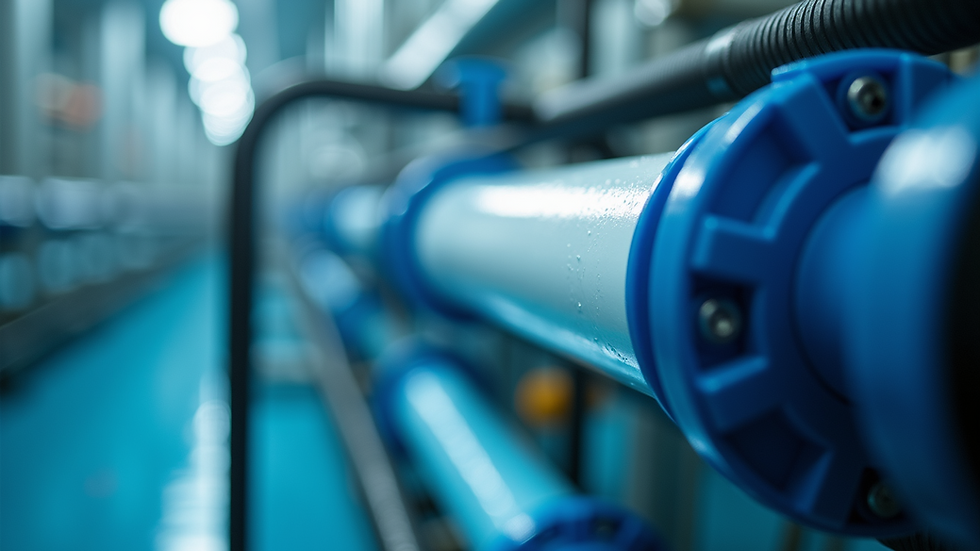Tips for Maintaining Efficient Water Filtration on Boats
- Omri Farbstein

- Jul 7, 2025
- 3 min read
Owning a boat comes with a myriad of responsibilities, and one of the most critical is ensuring your water filtration system is operating efficiently. When you're out on the open water, having access to clean and safe drinking water is not just a convenience—it's essential for your health and well-being. Here are some practical tips for maintaining your boat’s water filtration system.
Understanding Boat Filtration Systems
Boat filtration systems typically consist of various components designed to purify water for drinking, cooking, and cleaning. These systems can include pre-filters, carbon filters, UV lights, and reverse osmosis systems, depending on the type of vessel and the intended use of the water.
Understanding how these components work together is crucial for effective maintenance. For example, a carbon filter absorbs impurities and chemicals, while a UV light system kills bacteria and viruses. Regularly checking each component ensures that your system runs at peak efficiency.

Regular Replacement of Filters and Cartridges
One of the most significant aspects of maintaining your water filtration system is regular replacement of filters and cartridges as recommended by the manufacturer. Neglecting this can lead to a decrease in filtration effectiveness, which can ultimately affect water quality.
Typically, a carbon filter lasts about six months, while some reverse osmosis membranes can last between 2-5 years, depending on usage. It’s essential to check the user manual for specific guidelines regarding your filtration system. Keeping a record of when replacements are due can also help in ensuring that your filters are changed timely.

How long do PUR water filters last?
When discussing filter longevity, many boaters turn to trusted brands like PUR. On average, PUR filters last for around 2-3 months before they require replacement. However, this can vary based on water quality and usage rates.
Frequently testing your water after using a PUR water filter can help you understand whether it's still working effectively. Signs a filter might be finished include a change in water taste, a slower flow rate, or visible discoloration in the filter itself.
Note that proper storage and maintenance of any water filter, including one from puro water filter, can extend its lifespan. Always store filters in a cool dry place when not in use, and avoid exposing them to extreme temperatures.
Cleaning and Sanitizing the Water Tank
In addition to replacing filters, you should regularly clean and sanitize your water storage tank to prevent the buildup of algae, bacteria, and sediments. The cleaning frequency can depend on how often you use your boat, but a recommendation is to perform this task at least once a season.
To clean your water tank, drain all water and scrub the interior with a solution of vinegar or bleach mixed with water. Rinse thoroughly to ensure no cleaning residue remains. Additionally, if you notice any strange odors or cloudiness in your drinking water, it’s time to clean your tank sooner rather than later.

Monitoring Water Quality
Using a water testing kit is an excellent way to keep tabs on the quality of your boat's water. Make it a habit to conduct tests at regular intervals, particularly before long trips. These tests can help detect bacteria, chlorine levels, and pH balance, ensuring that you are always consuming safe water.
In some cases, you may need to adjust your filtration methods based on the test results. For example, if you find elevated bacteria levels, you might need to upgrade to a more advanced filtration system or enhance your current method with UV filtration.
The Importance of Seasonal Check-Ups
Just like any other mechanical part of your boat, water filtration systems require seasonal check-ups. Before heading out for your spring or summer adventures, examine all aspects of your water filtration system, including hoses, fittings, and connections, for any signs of wear or leaks.
This proactive approach helps catch potential issues early, which can save you time and money in the long run. Don’t forget to consider the environmental factors, too. If your boat has been moored in a marine area with heavy algae growth, you might need to check and clean your system more frequently.
Final Thoughts on Boat Water Filtration
Ensuring clean drinking water on your boat is critical for a safe and enjoyable experience on the water. With regular maintenance, timely filter replacements, and thorough cleaning, you can keep your water filtration system working efficiently. Whether you're taking a leisurely cruise or embarking on a long voyage, a quality water filtration process ensures your hydration needs are met without compromise.
Taking the time to care for your boat's water filtration system pays off in the long run, allowing you to focus on what matters most—enjoying the journey.




